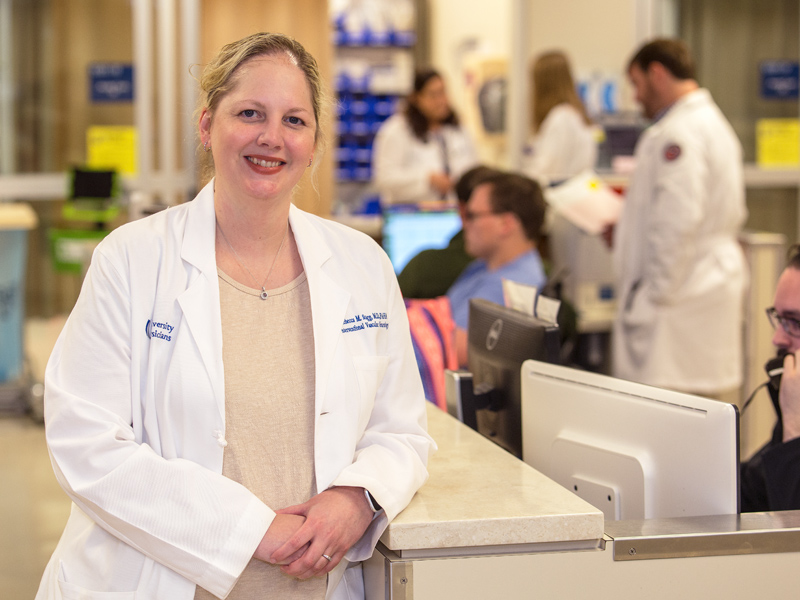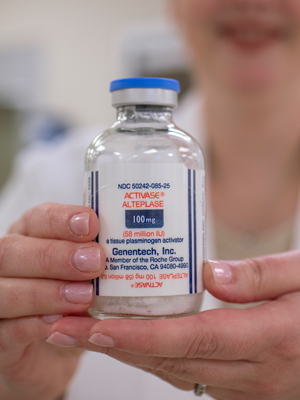Stroke study researches clot-buster recipients

When Mississippians suffering major strokes reach an emergency room, their lives can potentially be saved if medical staff administer a drug that dissolves clots that have blocked the flow of blood to their brains.
But too often, victims of a mild but disabling stroke – especially residents of rural areas – don’t get a tissue plasminogen activator, or tPA, quickly enough to help. In many cases, they don’t get it at all because they don’t get to an emergency room soon enough for an evaluation.
Researchers at the University of Mississippi Medical Center are working to find solutions by taking part in a three-year observational study. Dubbed Mild and Rapidly Improving Stroke Study, or MaRISS, the study brings together about 90 U.S. hospitals and academic medical centers, the American Heart Association/American Stroke Association, and the University of Miami Miller School of Medicine for the first large, standardized research study to evaluate long-term outcomes of people who experience mild strokes. UMMC, the only participant from Mississippi, is sharing in the recruitment of patients to be included in the research.
Although the study is national in scope, its implications for Mississippi are critical. Cardiovascular disease, including stroke, is the state’s leading cause of death, and Mississippi’s cardiovascular mortality rate is the highest in the nation, state Department of Health data shows. It accounts for more than a third of all deaths in Mississippi.

“When you look across the state, the highest percentage of people not receiving this medication who are eligible for it are those who have had a mild, disabling stroke,” said Dr. Rebeca Sugg, UMMC associate professor of neurology. “But, studies show that they can also benefit from this treatment.”
A stroke occurs when a clot blocks blood to the brain, or when a blood vessel in the brain bursts. Parts of the brain can become damaged or die. Although risk increases with age, strokes can happen at any age. Nearly 25 percent of strokes occur in people under the age of 65 nationally, but in Mississippi, that number is almost 50 percent.
Mild and rapidly improving stroke symptoms are common, affecting more than a third of all stroke patients who report to an emergency department, but most are not treated with clot-busting therapy, according to a 2011 study published in the journal Stroke.
However, up to one-third of these patients are unable to return directly to their homes and need immediate physical or occupational therapy to regain their independence. The MaRISS study aims to determine the long-term outcomes of such patients.
“This is an important research study that addresses an important group of patients who have the best chance of recovery from a stroke,” Dr. Jose Romano, M.D., MaRISS principal investigator and professor of clinical neurology at the University of Miami Miller School of Medicine, said in a news release. “The MaRISS study addresses a critical knowledge gap in stroke research, and we commend UMMC for being part of this vital study.”
How it will work: Using data from the American Heart Association/American Stroke Association’s quality improvement program, Get With The Guidelines-Stroke, researchers will examine outcomes of up to 2,650 patients with mild or rapidly improving stroke. Each participating hospital is expected to recruit about 30 patients during the course of the study, an estimated two patients per month, and follow-up with these patients by telephone at 30 and 90 days after enrollment.
UMMC operates an acute care stroke unit that combines leading-edge technology, expertise and specialty care. UMMC’s Stroke Center takes part in the Mississippi State System of Care as a state-designated stroke center. The Center’s facilities include the six-bed dedicated stroke unit and a 20-bed neurosciences intensive care unit.
“Treatment of patients with mild disabling stroke is controversial,” Sugg said. “Through this study, we hope to show that these patients will benefit from clot-dissolving medication.”


